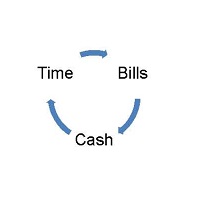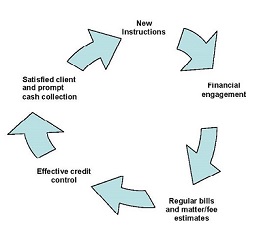Have you ever wondered how you as a trainee get paid, what the process is behind a law firm making money and what you can do to influence this? Unfortunately, the answer is not a simple one and the process which facilitates it is intricate and must be managed with care if the firm is to ensure its continued existence. Put simply, the diagram below shows how a law firm makes money.
This is what we call the ‘Working Capital Cycle’. As a trainee you will be asked to carry out work. You will record your Time for this work against the matter. When appropriate, the fee earner responsible for the matter will Bill the client for the work done. The Bill is then paid by the client which has essentially turned the work into Cash. The Cash is then used to pay the overheads of the firm including your wages.

How can you influence the Working Capital Cycle?
All time recorders (fee earners) have chargeable hours and fee targets.
- Fees earned = chargeable hours x charge out rate per hour
- Utilisation (productivity) = actual chargeable hours / target hours
- Recovery rate = hourly rate at which fees earned (taking account of any write offs) / standard (headline) rate
- Chargeable time serves both as the basis for invoicing clients and measuring productivity and performance
It is essential that all time is recorded, both chargeable and non-chargeable. Chargeable time is a key management tool. It allows partners to gauge whether they have given a realistic estimate for the work that we are undertaking. Furthermore, if your time is not recorded, it cannot be billed and most importantly turned into cash and we also cannot truly see what spare capacity we have within the firm.
How can you improve the firm's cash flow?
You hear time and time again that cash flow is the reason behind why a business has failed - cash is king! In simple terms, cash flow is the amount of money that is coming in and out of the business. If a business is in negative cash flow, they have more outgoings than they do incoming. Therefore, subject to using credit facilities, the business will fail as it will not be able to meet its liabilities when they fall due. You may be reading this and thinking: How does this apply to me as a trainee solicitor?
As a trainee solicitor you will be expected to record your time promptly. This will ensure that the time you do record can be billed at the earliest opportunity and turned into cash, thus improving the firm’s cash flow position. You may also be asked to help your supervisor with billing. It is absolutely imperative that bills are promptly raised and sent out on a periodic basis to ensure that the firm is in a positive cash flow position. At the end of each month, you expect your salary to be paid, therefore the firm needs the cash to pay you. The only way this is going to happen is if bills are sent out in a timely manner.
There is also the credit control process to think about. Just because the time has been recorded and the bill has been sent out, it is not actually turned into cash until the bill is paid. Just like any other business, law firms operate a strict credit control process. This is to ensure that bills are paid on time so the firm is in a positive cash flow position. You should be aware of what the firm’s credit control procedures are and not deviate from them.

Perhaps one of the most fundamental points to remember is that a firm will not survive without receiving business from its clients. The more satisfied a client is, the more likely that client is to return for repeat business. That’s why here at Howes Percival we deliver Excellence as Standard.
The key points highlighted by this article are:
- Record your time accurately and promptly,
- Help your team and supervisor with billing promptly,
- Stick to the firm’s credit control procedures, and
Deliver Excellence as Standard.
If you have any questions, please contact Leon Head on [javascript protected email address]



